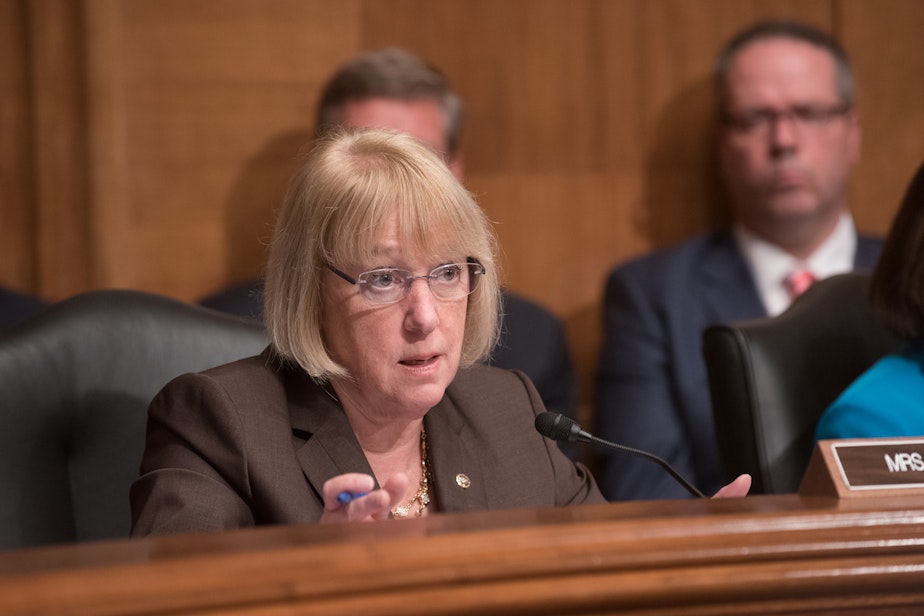Sen. Patty Murray on her push for voting rights and the future of democracy

In a speech Tuesday in Atlanta, President Joe Biden called on Congress to pass sweeping voting reforms. And he threw his support behind changing the filibuster rule, which would make it much easier for Democrats to pass legislation.
The Senate is poised to vote on the rule changes soon, and Washington Senator Patty Murray is among the supporters of that change — an exemption (elimination) of the filibuster. She spoke with KUOW’s Kim Malcolm about the path for passing a voting rights bill, which she says is the most important thing Congress can do.
The filibuster is a concept woven into the rules of the Senate. Once a bill reaches the Senate for consideration, members debate it. While the Senate only needs 51 votes to pass a bill, it needs 60 votes to cut off debate. It is therefore possible to keep a debate going so long that a bill never gets its vote. This tactic has been used in the past to prevent legislation from passing, often with bills related to civil rights.
This interview has been edited for clarity.
Senator Patty Murray: What I know about how a democracy works is that I go out on the Senate floor every day, and I fight for what I believe in. I use my voice to do that. The same goes for Americans in this country. They use their vote to say what they want the future of our democracy to look like. We have to make sure that that vote is never taken away, that their voice is never taken away, or we will not be a democracy in the future.
If your vote is stifled, if we don't believe in this democracy, we will not be able to move forward strongly, no matter what crisis faces us in the future.
Kim Malcolm: What are the core elements that you need to see in a bill for it to pass?
There are a number of things in the Freedom to Vote Act that curb partisan gerrymandering, that allow voters the option to request a mail-in ballot. It imposes uniform early voting rules so that people who can't get to the polls on election day have the option to be able to get there.
Sponsored
The goal of this is to make sure everybody has equal access to go vote. What we're seeing right now, sadly, is a number of Republican-led state legislatures limiting the rights of their citizens to vote. This is when we need to stand up as a country and say, "That's not how we work." We have to make sure, at the federal level, we prohibit those kinds of actions that make it impossible for somebody to vote.
I think one of the exhausting things for people listening to this debate is just the knife fights we’re seeing over these arcane rules in the Senate to try to get this thing to move forward. What are the realistic chances of that actually happening at this point?
First of all, let me say I am so disappointed that not one Republican will stand with us to protect this democracy, to make sure everyone has the right to vote. Because of that, Democrats have to get this done on their own.
We have to have 50 votes, which I believe we have. Then we have Senate procedures standing in the way, an oblique Senate procedure, that virtually allows the minority to stop even a debate on this. So, as someone who believes strongly in the right of the minority party to have a voice, I know personally that the way the Senate runs right now is keeping us from protecting our democracy.
If the filibuster rule is changed by Democrats just for the voting rights legislation, then if and when Republicans gain control of the chamber they could use that opening to pass all kinds of bills to undermine or overturn voting rights. How seriously do you weigh that risk?
I weigh it considerably. I'm one who believes strongly in the right of the minority party to have a voice, but we have reached a point where the Senate is not productive, because one senator can just say, "I don't want to have a debate," and we don't even get to debate the issue. We don't get to discuss it. I for one believe that our democracy will be stronger if people can see where we stand, and we are allowed to have a debate to move forward.
I also think that the way this filibuster rule has been implemented is now pushing Democrats and Republicans further into their own corners, rather than toward collaboration, which is really what the filibuster was designed to do, to force people to work together. It's the opposite effect right now, because of the way it's being used, and the misuse of the rules.
Of course, not every Democrat in the Senate is on board with changing the filibuster rule. I'm thinking about your colleagues, Joe Manchin and Kyrsten Sinema. Do you think they're going to get on board with this in the next few days?
We are working constantly to try and find a path forward that all 50 Democrats can agree to and we're in those conversations right now as we speak.
Listen to the interview by clicking the play button above.





